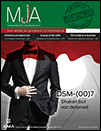Unprofessional behaviour on social media by medical students
Abstract
Objectives: To describe the social media usage patterns of medical students and to identify factors associated with their posting of unprofessional content on social media.
Design: Voluntary survey, delivered online.
Setting: All students in all 20 Australian medical schools were eligible to participate (16 993 individuals).
Participants: Of 1027 initial respondents during the study period (29 March – 12 August 2013), 880 completed the survey.
Main outcome measures: Prevalence of unprofessional online behaviour on social media by medical students, as reported by students about their own and others' accounts.
Results: Posting of unprofessional content was self-reported by 306 students (34.7%), mainly depictions of intoxication (301 students, 34.2%) or illegal drug use (14 students, 1.6%), or posting of patient information (14 students, 1.6%). Posting of unprofessional content was associated with posting evidence of alcohol use and racist content online, MySpace use, and planning to change one's profile name after graduation. Factors associated with reduced unprofessional content included believing that videos depicting medical events with heavy alcohol use were inappropriate, and being happy with one's own social media portrayal. Exposure to guidelines on professional online conduct had no effect on posting behaviour.
Conclusions: Social media use was nearly universal in the surveyed cohort. Posting of unprofessional content was highly prevalent despite understanding that this might be considered inappropriate, and despite awareness of professionalism guidelines. Medical educators should consider approaches to this problem that involve more than simply providing guidelines or policies, and students should be regularly prompted to evaluate and moderate their own online behaviour.




